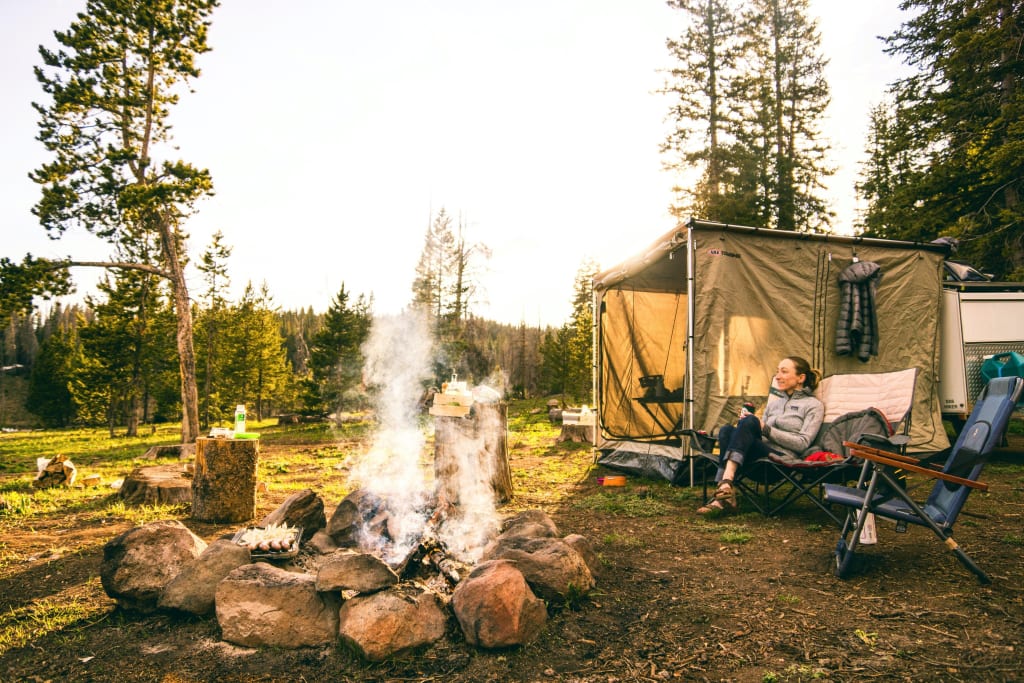Camping offers an excellent opportunity to disconnect from the digital world and embrace the great outdoors. Whether you’re a seasoned camper or a beginner, this guide will help you plan a successful and enjoyable camping trip.
Why Go Camping?
- Connection with Nature:
- Camping allows you to immerse yourself in the natural environment, which can be incredibly refreshing and rejuvenating. The sights, sounds, and smells of nature provide a much-needed break from urban life.
- Physical and Mental Health Benefits:
- Engaging in outdoor activities like hiking, swimming, and fishing can improve your physical health. Exposure to natural light and fresh air also helps reduce stress, improve mood, and boost mental well-being.
- Family and Social Bonding:
- Camping is a great way to spend quality time with family and friends. Activities like cooking together, exploring trails, and sharing stories around the campfire foster stronger relationships and create lasting memories.
Planning Your Camping Trip
- Selecting a Campsite:
- Research: Choose a campsite that suits your preferences, whether it’s near hiking trails, lakes, or other amenities. Check for campsite availability and any reservation requirements.
- Amenities: Consider the facilities available at the campsite, such as restrooms, showers, and picnic tables. This will help you decide what additional gear you need to bring.
- Essential Gear and Supplies:
- Shelter: Pack a durable tent, a sleeping bag suitable for the weather, and a sleeping pad for comfort. If you’re camping in colder weather, bring extra blankets and insulation.
- Clothing: Dress in layers to adapt to changing weather conditions. Include waterproof clothing, warm layers, and comfortable hiking shoes.
- Food and Cooking Supplies: Plan meals that are easy to prepare outdoors. Bring a portable stove, cookware, utensils, and enough food and water for the duration of your trip.
- Safety and Navigation:
- First Aid Kit: Carry a well-stocked first aid kit and know basic first aid procedures.
- Navigation Tools: Bring a map, compass, or GPS device. Familiarize yourself with the area and any emergency contact information.
Setting Up Camp
- Choosing a Campsite:
- Select a flat, dry area free of rocks and debris. Avoid setting up camp near potential hazards like dead trees, cliffs, or areas prone to flooding.
- Ensure your campsite is at least 200 feet away from water sources to minimize environmental impact and protect wildlife.
- Pitching Your Tent:
- Practice setting up your tent before you go. Secure it with stakes and guy lines to withstand wind and rain.
- Use a ground tarp or footprint under your tent to protect it from moisture and damage.
- Building a Campfire:
- Follow local regulations and use designated fire pits or rings if available. Gather small sticks and kindling to start your fire, and add larger logs gradually.
- Keep your fire small and manageable. Always have water and a shovel nearby to extinguish the fire completely before leaving or going to bed.
Activities to Enjoy While Camping
- Hiking and Exploring:
- Choose trails that match your fitness level and interests. Bring plenty of water, snacks, and a trail map. Take your time to enjoy the scenery and observe wildlife.
- Practice Leave No Trace principles by staying on designated trails, respecting wildlife, and packing out all trash.
- Water Activities:
- Swimming: Find safe swimming spots free from strong currents and underwater hazards. Always swim with a buddy and follow safety guidelines.
- Fishing: Check local fishing regulations and obtain necessary permits. Bring appropriate fishing gear and practice catch-and-release to conserve fish populations.
- Nighttime Activities:
- Stargazing: Camping provides an excellent opportunity to enjoy the night sky away from light pollution. Use a telescope or binoculars to enhance your stargazing experience. Apps and star charts can help identify constellations and planets.
- Campfire Fun: Gather around the campfire for storytelling, singing, and playing games. Traditional campfire activities like roasting marshmallows and making s’mores add to the enjoyment.
Leave No Trace Principles
- Plan Ahead and Prepare:
- Research the area you’ll be visiting and understand local regulations. Prepare for varying weather conditions and potential hazards.
- Travel and Camp on Durable Surfaces:
- Stick to established trails and campsites. Avoid fragile environments like wetlands and meadows.
- Dispose of Waste Properly:
- Pack out all trash and dispose of it properly. Use toilets if available, or dig a small cathole at least 200 feet away from water sources and trails for human waste.
- Leave What You Find:
- Preserve the natural environment by leaving rocks, plants, and artifacts as you found them.
- Minimize Campfire Impact:
- Use a camp stove for cooking when possible. If you build a fire, keep it small and use only small sticks. Ensure it is completely extinguished before leaving.
![Car Camping Essentials: Ultimate Packing Checklist [2024]](https://travelfreak.com/wp-content/uploads/2023/02/car-camping-kitchen.jpg)
- Use a camp stove for cooking when possible. If you build a fire, keep it small and use only small sticks. Ensure it is completely extinguished before leaving.
- Respect Wildlife:
- Observe animals from a distance and do not feed them. Store food securely to avoid attracting wildlife to your campsite.
- Be Considerate of Other Visitors:
- Respect other campers by keeping noise levels down and following campground rules. Yield to other hikers on trails and be mindful of shared spaces.
Camping provides a unique opportunity to connect with nature, relax, and create unforgettable experiences. By preparing thoroughly and practicing responsible camping habits, you can ensure a safe, enjoyable, and environmentally-friendly camping trip.


